- Home
- William Kennedy
Legs Page 7
Legs Read online
Page 7
"They're just another kind of wallpaper to the bum," Jack said.
I accept Jack's Gatsby connection because he knew Edward Fuller, Fitzgerald's neighbor on Long Island who was the inspiration for Gatsby. Fuller and Rothstein were thick in stocks, bonds, and bucketshops when Jack was bodyguarding Rothstein. And, of course, Fitzgerald painted a grotesque, comic picture of Rothstein himself in Gatsby, wearing human molar cuff buttons and spouting a thick Jewish accent, another reason Jack would have read the book.
I rode with The Goose in Jack's roadster and tried to make a little conversation.
"You known Jack long?"
"Yeah," said Murray, and then nothing for about three miles.
'"Where'd you meet him?"
"'Th'army," said Murray, not spending two words where one would do.
"You've been working with him since then?"
"No, I did time. Jack, too."
"Ah."
"I got nine kids."
Murray looked at me when he said this, and I guess I paused long enough before I said, "Have you?" to provoke him.
"You don't believe me?"
"Sure I believe you. Why shouldn't I?"
"'People don't believe I got nine kids."
"If you say it, I believe it. That's a lot of kids. Nobody lies about things like that. "
"I don't see them. Once a year. Maybe, maybe not. But I send 'em plenty."
"'Uh-huh."
"They don't know what I do for a living."
"Oh?"
Then we had another mile or so of silence, except for the thunder and lightning and the heavy rain, which kept Murray creeping slowly along the snaky road down the mountain. I judged him to be about forty-five, but he was hard to read. He might've seemed older because of the menace he transmitted, even when he talked about his kids. His mouth curled down into a snarley smile, his lone eye like a flat spring, tightly coiled, ready to dilate instantly into violent glare. He was obviously the pro killer in the gang, which I deduced as soon as I saw him. Oxie may have had some deadly innings in his career, but he looked more like a strongarm who would beat you to death by mistake.
Murray's clothes were a shade too small for him, giving him a puffy, spaghetti-filled look. I thought I detected tomato sauce stains on his coat and pants and even his eyepatch. I choose to believe he was merely a slob rather than inefficient enough to walk around with bloodstains from his last victim. I doubt Jack would have approved of that sort of coarseness.
"You workin' for Jack now?" Murray asked me.
"Tentatively," I said, wondering whether he understood the word, sol added, "for the time being I guess I am."
"Jack is a pisser."
"Is he?"
"He's crazy. "
"Is that so?"
"That's why I work for him. You never know what'll happen next."
"That's a good reason. "
"He was crazy in the Army. I think he was always crazy."
"Some of us are."
"I said to myself after he done what he done to me, this is a crazy guy you got to watch out for because he does crazy stuff. "
"'What did he do to you?"
"What did he do to me'? What did he do to me?"
"Right."
"I was in the stockade at Fort Jay for raping a colonel's wife, a bum rap. I only did her a favor after she caught me in the house and I rapped her one and she fell down. Her dress goes up and she says, 'I suppose you're gonna strip and rape me,' and I hadn't figured on it, but you take what comes. So I'm in for that, plus burglary and kickin' an MP when Jack comes in to wait for his court-martial.
" 'Whatcha in for?' I asked him.
" 'Desertion and carrying a pistol.'
" 'That's heavy duty.'
" 'I figure I'll do a little time,' he said. 'They want my ass.'
" "Likewise,' I said and told him my story.
" 'What'd you do before you got in'?' he asks me and I tell him, 'I was a burglar.' He got a kick out of that because he done a bit for the same thing when he was a kid. So we talk and Jack gets a pint of whiskey from the corporal who made bedcheck. I don't drink that shit, so Jack asks me if I wanna drink some rain instead. It's raining out just like now, and Jack puts a cup out the window. Took about five minutes to fill it up part way, and by that time Jack's whiskey is most gone and he gets the cup of rain and gives it to me.
" 'I don't want no rain,' I says to him. 'It's dirty.'
" 'Who says it's dirty'?'
" 'Everybody says.'
" 'They're wrong,' he says. 'Best water there is.'
" 'You drink it,' I says, 'I don't want no part of any dirty, shitty rain.'
" 'Goddamn it, I told you rain wasn't dirty. You think I'd drink rain if it was dirty?' And he takes a drink of it.
" 'Anybody who'd drink rain'd shit in church,' I says to him.
" 'Did you say shit in church'?'
" 'Shit in church and then kick it out in the aisle.'
" 'That's a goddamn lie. I'd never shit in church.'
" 'If you'd drink rain, you'd shit in church all right.'
" 'Not me. I'd never shit in church. You hear that, goddamn it? Never!'
" 'All them rain drinkers. They all shit in church.'
" 'Not me, no sir. Why do you say that'?'
" 'I never knew an Irishman wouldn't shit in church if he thought he could get away with it.'
" 'Irishmen don't shit in church. I don't believe that.'
" 'I seen four Irishmen at the same time, all taking a shit in church.'
" 'Polacks shit in church.'
" "I once seen an Irishman shit right in the holy water fountain.'
" "That's a goddamn lie.'
" 'Then I seen two Irishmen takin' shits in the confessional boxes and about a dozen more takin' shits up on the altar all at once. I seen one Irishman shit during a funeral. Irishmen don't know no better.'
"I was layin' on my cot while this was going on. Then Jack got up and punched me in the right eye so hard I lost the sight of it. Jesus, that was a crazy thing to do. I didn't even see it comin'. I had to kick him all over the room, broke ribs and stuff. The guards pulled me off him. I woulda killed him if I knew the eye was gone, but I didn't know it then. When I saw him a week later he got down on his knees and asked me to forgive him what he done. I said, 'Fuck you, Jack,' and left him on his knees. But we shook hands before I left and I told him 'Okay, don't worry about it.' But I was still sore about it. I done six years because the MP I kicked died, and when I come out I looked Jack up because I figure he owes me a job. He thought he did a tough thing about the eye, but shit, once you get used to one eye it's just as good as two. And workin' for Jack, you get to do everything you got to do, so I got no complaints."
* * *
We were about halfway down the mountain when Murray hit the brakes, but not soon enough, and we skidded into a rock slide and smashed into a boulder that must've just landed because other little rocks kept bouncing off the car. Both of us hit the windshield, and I got a hell of a bump and a four-day headache out of it. Murray's forehead was cut, a horizontal gash like a split seam.
"We better haul ass before another one falls on top of us," Murray said, a thought I hadn't had yet since I was preoccupied with my pain. He tried backing up, but the car made a weird noise and was hard to move. He got out in the rain and so I got out after him. There was about one foot between me and about a four-hundred-foot drop, so I got carefully back inside and out Murray's door. He was pulling on the front left fender, which was smashed and rubbing against the wheel. Murray was a small man but a strong one, for the fender came almost straight at this tug. He cut his right hand on the edge of it, and when I offered him my pocket handkerchief, he shook his head and scooped up a handful of earth and grass and patted it on his forehead and then globbed a wad into his sliced right palm. "Get in," he said, his face and hand smeared and dripping with bloody mud.
"I'll drive," I told him.
'"No, I'll handle it."
<
br /> "You're in no shape to drive. "
"This is not your car, mister," he said in a tone that was unarguably the last word.
"All right, then, back up and turn around. I'll direct you. You're damn near over the edge right there, and it's one hell of a long way down."
It was dark now and I was wet to the underwear, standing in the middle of desolation, maybe about to be buried in a landslide, giving traffic directions to a bleeding, one-eyed psychopath who was, with one hand, trying to drive a mythic vehicle backwards up an enchanted mountain. I'd come a long way from the K. of C. library.
JOHNNY RAW,
JACK
GENTLEMAN
Jack came to Albany to see me four days after my time on the mountain. He was full of Europe and its glories, the spas at Bad Homburg and Wiesbaden, the roulette and baccarat in the casinos where croupiers spoke six languages, the eloquent slenderness of the Parisian whore. He came to my office with Fogarty; he was in town on other business we didn't discuss but which I presume was beer supply for his expanding clientèle. He handed me five hundred cash as my initial retainer.
"What do I do for this?"
"Buy a ticket to Europe."
"Jack, I've got no good reason to go to Europe."
"You owe it to your body," he said. "All that great wine and great food."
"All right, maybe," I said. But what, really, did I need with this kind of action? Where was the profit? Jack merely said he'd be in touch within the week and that was that. Then I got a weird call at three the next morning from him, saying he'd decided to go to New York immediately instead of next week and leave for Europe in the afternoon if he got the booking, and was I ready, did I live in control of the quick decision or was I going to take a week to think it over? It meant being in Manhattan in about nine or ten hours and committing myself to the booking and turning off my practice. He kept saying, "Well? Well? What do you think?" And so I said, "All right, yes," against all sane judgment, and he said, "You're a winner, Marcus," and I rolled over and went back for two more hours. Then I closed off my Albany life with four phone calls and caught the ten thirty train to New York.
* * *
A fox terrier leaped overboard, an apparent suicide, the day the news broke aboard ship that Charlie Northrup's bloodstained Buick was found in a Sixty-first Street garage near the Brooklyn Army Base. The garage was owned by Vannie Higgins, a pal of Jack's and the crown prince of Long Island rum-runners. Oxie and a Brooklyn couple, the wife a pal of Alice's, were arrested in their apartment with an arsenal: tear-gas grenades, ammo, flares, fountain-pen pistols, bulletproof vests, and enough explosives to blow up a city block. Brooklyn war with Capone, said the papers. Oxie said only that he was sleeping on Jack's porch at Acra when two men he wouldn't identify woke him and offered him fifty bucks to take the Buick to New York and dump it. Cops saw him and the other man near a Fifty-eighth Street pier acting suspiciously, and Oxie admitted that the blocks in the Buick were to be used to run it over the stringpiece.
We were two days out of New York on the Belgenland, bound for Plymouth and Brussels, and suddenly our foursome—Jack, Count Duschene, Classy Willie Green, and myself—was the center of all attention. Jack was traveling under the name of John Nolan, a name of notable nautical import, and he got away with it until the radio brought news bulletins from the New York City police commissioner, a feisty old Irishman named Devane, that Jack was fleeing from a foul murder and was now on the high seas, bound for England to buy dope.
He wasn't wanted by the police, but Devane felt it his duty to alert the nations of Europe that a fiend was approaching. The Northrup car was the subject of daily bulletins in the ship's newspaper, and as the mystery of what happened to Charlie intensified, so did Jack's celebrity. Passengers snapped his picture, asked for his autograph, assured him they didn't believe such a nice person as he was would have anything to do with such terrible goings on.
The fox terrier: He appeared as I stood on the sports deck near the rail, while Jack was shooting skeet. I saw nothing chasing the dog, which came at me in a blur of brown and white, but there must have been something, for he was panicky or perhaps suddenly maddened. He took a corner at high speed, dead-ended into a bulkhead, turned around, and leaped through the rail, flailing like a crazy-legged circus clown falling off a tightrope into a net. I saw him surface once, go into a wave, bob up again, and then vanish. I doubt anyone else saw it.
A man finally came toward me at a brisk pace and asked if I'd seen his dog, and I said, yes, I'd just seen it leap overboard.
"Leap overboard?" the man said, stunned by the concept.
"Yes. He leaped."
"He wasn't thrown?"
'"Nobody threw him, I can tell you that. He jumped. "
"A dog wouldn't leap overboard like that."
He looked at me, beginning to believe I'd killed his dog. I assured him I'd never seen such a thing either, but that it was true, and just then he looked past me and said, "That's Legs Diamond," the dog instantly forgotten, the man already turning to someone to pass along his discovery. In a matter of minutes a dozen people were watching Jack shoot. He had been reloading during my encounter and saw the crowd before he put the shotgun again to his shoulder. He fired, missed, fired, missed. The crowd tittered, but he looked at them and silenced the titters. He fired again, missed again, fired again, missed again, and thrust the gun angrily at the man in charge of lofting the clay pigeons. Then he and I went quickly down to the parlor where Classy Willie and The Count, a dapper pair, were jointly relieving four other passengers of their vacation money in a poker game. I knew neither The Count nor Willie before I boarded the ship with Jack, but it turned out that The Count was Jack's international associate, an expert bottom dealer who spoke French, German, and Spanish and did not lose his head in the presence of too many forks, and that Classy Willie was a card thief, specializing in ocean liners, who had been hired by Jimmy Biondo to represent him in the dope deal. Willie had a certain suavity behind his pencil-line mustache, but he was also known for his erratic violence on behalf of his employer.
I understood these relationships only much later. At this point in the trip I assumed both men worked for Jack. I asked Jack about Oxie and the car and he said, "I take no responsibility for mugs like him once they're out of my sight."
"Goddamn it, Jack, you've got me involved in the biggest murder case in upstate New York in Christ knows how long and you give me this evasive routine?"
"Who said you're involved? I'm not even involved."
"You're involved. On the radio is involved."
"Tomorrow there'll be an earthquake in Peru and they'll try to stick me with it. "
"Bullshit."
"Shove your bullshit up your ass," he said and walked away.
But he came back an hour later and sat down beside me in a deckchair, where I was brooding on my stupidity and reading Ernest Dimnet on how to think better, and he said, "How's things now?"
"I'm still involved."
"You worry a lot, Marcus. That's a bad sign. Gets you into trouble. "
"I'm in trouble now because I didn't worry enough."
"Listen, you got nothing to be afraid of. Nobody's after your ass, nobody wants to put you on the spot. I never knew a fucking lawyer yet couldn't talk his way out of a sandstorm. You'll do all right if you don't lose your head."
"There was blood in that car, and Oxie was with it. And Oxie is your man. "
"Somebody could've had a nosebleed. For chrissake, don't fuck me AROUND!" And he walked away from me again.
We didn't speak a direct word to each other, apart from pass the salt, for two days. My plan was to get off at Plymouth and get the next boat home. I observed him from a distance, seeing people go out of their way for a look at him playing cards in his shirtsleeves. I saw a blond librarian ask him to dance and begin a thing with him. He was a bootlegger and, as such, had celebrity status, plus permission from the social order to kill, maim, and befoul the legal system, for wasn
't he performing a social mission for the masses? The system would stay healthy by having life both ways: first, relishing Jack's achievement while it served a function, then slavering sensually when his head, no longer necessary, rolled. This insight softened my hard line of Northrup. Maybe it was all a bootlegger's feud, which somehow made the consequent death okay. Let others assess the moral obliquity in this.
Jack went through a tango with the librarian, who was from Minneapolis, a fetchingly rinsed-out blonde who wore schoolmarmish tweed suits with low-cut blouses beneath. You saw the blouses only when she peeled off the top covering as the dancing went on and on. Jack invited her to eat with us when he started up with her, and he saw to it that none of us lingered over coffee.
Then one day at dinner she wasn't there. Her empty chair went unremarked upon until Jack himself gestured toward it and said, "She wanted my autograph on her briefs," which I thought was a quaint euphemism for Jack.
Everyone laughed at the absurdity, even me.
"I gave her a bullet," Jack said, and I fell into uncertainty until he added, "She says to me, 'It's the right shape but the wrong size.' And I told her, 'Use it sideways."
We were swilling duck a l'orange when the librarian came up to the table with her jacket off and put her face inches away from Jack's.
"You turn women into swine," she said.
Jack nodded and bit the duck.
* * *
The morning news was that the search for Charlie Northrup had turned into one of the biggest manhunts in New York State history. He was presumed dead, but where? On top of this came a cable from Jimmy Biondo to Classy Willie, precipitating an impromptu meeting of our small quartet in Jack's cabin. Willie arrived, visibly equipped with a pistol for the first time since we boarded ship. Sensing tension, I got up to leave. But Jack said stick around, and so I did.

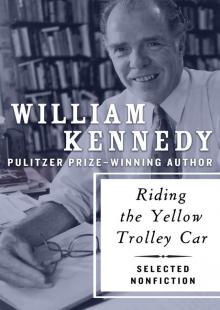 Riding the Yellow Trolley Car: Selected Nonfiction
Riding the Yellow Trolley Car: Selected Nonfiction Changó's Beads and Two-Tone Shoes
Changó's Beads and Two-Tone Shoes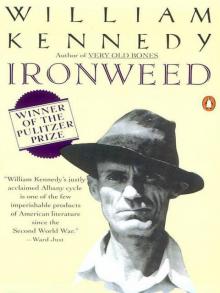 Ironweed
Ironweed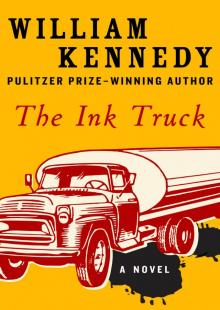 The Ink Truck
The Ink Truck Billy Phelan's Greatest Game
Billy Phelan's Greatest Game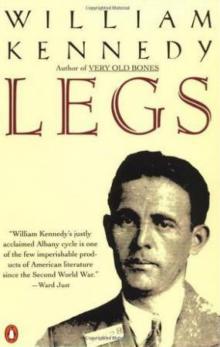 Legs
Legs Very Old Bones
Very Old Bones The Last Mission
The Last Mission The Flaming Corsage
The Flaming Corsage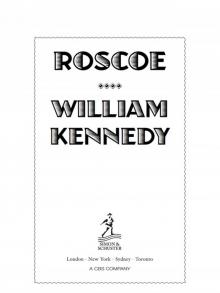 Roscoe
Roscoe Quinn's Book
Quinn's Book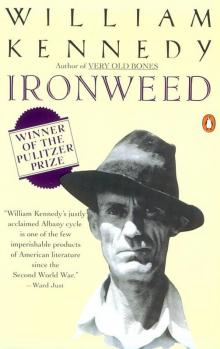 Ironweed (1984 Pulitzer Prize)
Ironweed (1984 Pulitzer Prize)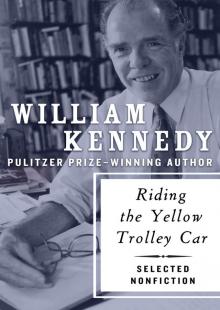 Riding the Yellow Trolley Car
Riding the Yellow Trolley Car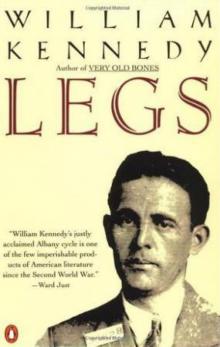 Legs - William Kennedy
Legs - William Kennedy